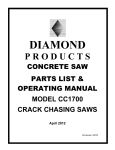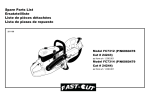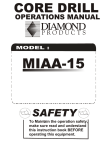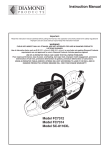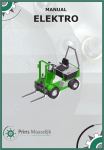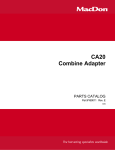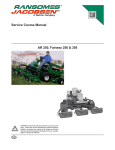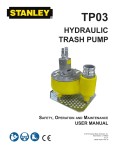Download Diamond CC21 Operator`s manual
Transcript
DIAMOND PRODUCTS HYDRAULIC HAND SAW OPERATOR’S MANUAL MODEL CC21 Part #: 1800757 Table of Contents Description Page No. Chapter 1 – Safety ………………………………………………………………………….. Personal Safety………………………………………………………………………. Blade Safety…………………………………………………………………………… General Saw Safety…………………………………………………………………. Cutting/Work Area Safety…………………………………………………………. 3 3 3 4 4 Chapter 2 – Technical Data………………………………………………………………… Dimensions……………………………………………………………………………. Weight…………………………………………………………………………………… Blade Drive…………………………………………………………………………….. Hydraulic System…………………………………………………………………….. Maximum Cutting Depth…………………………………………………………… 5 5 5 5 6 6 Chapter 3 – Hydraulic Hand Saw Set Up Instructions………….………………….. Hydraulic Line Connections………………………………………………………. Mounting a Standard Blade………………………………………………………. Setup………..………………….……………………………………………………… 7 7 7 7 Chapter 4 – Operating the Saw…………………………………………………………… Standard Cutting…………………………………………………………………….. Correcting a Wandering Cut….……………………………………………………. 8 8 8 Chapter 5 – Troubleshooting……………………………………………………………… 9 Chapter 6 – Maintenance………………………………………………………………….. Before Each Use….………………………………………………………………….. After Each Use……………………………………………………………………….. Annually……………………………………………………………………………….. Miscellaneous…………………………………………………………………………. 10 10 10 10 10 Chapter 1 SAFETY Your Diamond Products CC21 hydraulic hand saw has been designed to be as safe and efficient as possible. However, hand sawing can be hazardous if proper safety precautions are not taken and operating instructions are not followed carefully. Study this manual and remember all warnings, cautions, and tips. Keep a copy of the manual near the job site to allow the operator to review any section as needed. SAFETY WARNINGS PERSONAL SAFETY • • • • • • • • • • Read and understand instructions before operating saw. Wear proper safety clothing, including hardhat, respirator, gloves, and safety glasses. Avoid loose fitting clothing. Sturdy boots with non-skid soles aid in providing proper footing. Steel-toed safety boots are recommended. Cutting steel reinforcing bar produces sparks, avoid clothing of flammable material. Know how to stop the saw quickly in an emergency. Noise levels can be very high. Wear OSHA-approved hearing protection at all times while the saw is operating. Keep all parts of your body away from the blade and all other moving parts. Do not operate the wall saw if you are under the influence of drugs or alcohol. Do not use hands to search for hydraulic fluid leaks. Fluid escaping under pressure can penetrate skin and cause severe injury. If any fluid is injected into the skin, seek medical attention immediately. Wear protective work gloves to avoid contact with concrete slurry that can cause serious skin irritation. BLADE SAFETY • Inspect the blade carefully before use. The blade should have no cracks, nicks, or flaws. The arbor hole should be undamaged. Use only steel centered wet cutting diamond blades manufactured for use on concrete hand saws. • Do not use dry cutting diamond blades, high-speed steel blades, carbide tipped blades, or abrasive blades. • Only use blades marked with a maximum operating speed higher than the blade shaft speed of 2500 rpm. • Ensure the hydraulic power pack is set at a flow rate of 17 gpm or below when using the 1.58 cu in. displacement motor and at a flow rate of 14 gpm or below for the 1.28 cu in. displacement motor. (See Chapter 2; Technical Data) • Cut only stone, concrete, reinforced concrete, and masonry materials. Do not cut materials such as wood, glass, or plastic. • Inspect flanges for damage, excessive wear, and cleanliness before mounting the blade. The blade should fit snugly on a clean, undamaged shaft. • • Hydraulic power units are designed with the ability to vary the blade speed. Never operate the saw at a speed higher than the maximum safe allowable speed indicated on the blade. If you are unsure of the operating speed, contact the manufacturer or Diamond Products. Avoid getting in direct line with the blade. GENERAL SAW SAFETY • Never leave the saw unattended while running. • Do not exceed the rated pressure of hydraulic components. If you are unsure, contact the manufacturer or Diamond Products. Verify that the saw is operating properly before cutting. Never operate the saw without sufficient water flow to cool the blade and flush out cutting debris. Always disconnect the power unit before servicing the saw. Never try to connect or disconnect the power unit while the power unit is running and/or the hoses are under pressure. Before cutting, be sure that there are no electric, water, or gas lines in the area you are working. Do not saw if you are unsure of the presence of utility lines in the work area. Keep both hands on the saw while it is in operation. • • • • • • CUTTING/WORK AREA SAFETY • Never operate the saw in any application or job where you are not properly trained or supervised. • Operate gas/diesel power packs only in well-ventilated areas. • Place barricades or tape to block off the work area. Keep bystanders, animals, and unnecessary equipment out the work area. Do not operate the saw near combustible material or fumes. Sparks occur during sawing that may cause a fire or explosion. • FAILURE TO COMPLY WITH THE PRECEDING WARNINGS COULD RESULT IN SERIOUS BODILY INJURY. Chapter 2 TECHNICAL DATA DIMENSIONS: 9.1 24.8 4.8 22.2 13.2 15.3 21.8 WEIGHT Saw only (W/O Blade) 35 lb. (16 kg) Saw + Casappa motor 42 lb. (19 kg) BLADE DRIVE Standard: Hydraulic motor 1.58 cu in. displacement Hydraulic Fluid Flow Rate 12 to 17 gpm Max. Safe Speed: 2500 rpm @17 gpm Optional: Hydraulic motor 1.27 cu in. displacement Hydraulic Fluid Flow Rate 10 to 14 gpm Max. Safe Speed: 2500 rpm @ 14 gpm *Safe Blade Speed (RPM) = GPM x 231 Motor Displacement WARNING! Spinning the blade faster than the manufacturer’s recommended speed can damage the blade and cause serious personal injury. Some manufacturers, including Diamond Products, mark the maximum safe RPM on the blade. HYDRAULIC SYSTEM Your CC21 hydraulic hand saw is designed to operate from a separate hydraulic power unit providing either 10 to 14 gpm at 2500 psi (1.27 CI Motor) or 12 to 17 gpm at 2500 psi (1.58 CI Motor). MAXIMUM CUTTING DEPTH The CC21 hydraulic hand saw will cut to within 2 1/8” of the blade center. The maximum depth of cut is 7-7/8”. Chapter 3 HYDRAULIC HAND SAW SET UP INSTRUCTIONS HYDRAULIC LINE CONNECTIONS WARNING! Never try to connect or disconnect the hoses while the power unit is running and/or the hoses are under pressure. 1. Connect the hydraulic lines to the blade drive motor and the water line to the water manifold. 2. Ensure the lines are located such that they will not interfere with travel or be cut by the blade. 3. Before mounting the blade, be sure the blade shaft turns clockwise (looking toward the saw at the blade). Incorrect blade rotation will cause increased wear, damage the blade, and may blow out motor seals. MOUNTING A STANDARD BLADE 1. Be sure you have the correct diamond blade. Using a blade not manufactured for hand saw use could result in serious bodily injury. 2. Inspect the flanges and clean or replace if necessary. Inspect the blade for damage to the arbor hole before mounting the blade. 3. Place the blade over the arbor on the inner flange. Be sure the arrow on the blade is pointing in the direction of rotation. Reversing the blade will cause higher blade wear. The drive pin on the inner flange must go completely through the corresponding hole in the blade. 4. Place the outer flange over the arbor. Ensure that the drive pin from the inner flange aligns with the corresponding hole in the outer flange. 5. Tighten the flange nut to lock the blade in place. (NOTE: This is a left-hand nut.) SETUP 1. Never use conventional (wet) diamond blades without cooling water. 2-1/2 to 5 gallons per minute of water flowing across the blade is required to maintain proper cooling and attain maximum blade life. 2. Test the water source to ensure water spray tubing is free from obstructions and that adequate water flow is available to the blade. WARNING! Before marking the cut line, ensure there are no electric, gas, or water lines in the work area. Cutting into a utility line could cause electrocution, injury, or death. 3. Mark the cutting line clearly so that the saw operator can follow the line without difficulty. Chapter 4 OPERATING THE SAW NOTE Ensure the saw is properly set up and ready for operation in accordance with Chapter 3 of this manual. STANDARD CUTTING WARNING! Never stand directly in line with a spinning blade. Severe injury could result if a segment breaks off or the blade fractures. 1. Before starting any cut, make sure there is enough room to work without reaching beyond your area of control. Ensure there is enough hydraulic and water hose length to complete the cut without creating a safety hazard. 2. Start the cooling water flow to the blade. 3. With the saw blade above the cut, squeeze the trigger and allow the saw blade to reach operating speed before the blade contacts the surface. 4. Pivot the saw on the front edge and slowly lower the blade into the cut line approximately 2”–3”. 5. Run the saw along the cut line until the end of the cut. 6. At the end of the cut, pivot the saw on the front edge and raise the blade until it clears the cut, then release the trigger. 7. Allow the blade to come to a stop before setting it down. 8. All cuts must be made in 2”-3” increments until the desired depth of cut is attained. 9. • If the cut runs lengthwise through a reinforcing bar, cut completely through it in one pass to prevent the blade from deviating in the cut and jamming. • Attempting to cut too deep in one pass will result in a poor quality cut and may cause the blade to jam. When the final cut is complete, turn off the power unit and water supply, relieve the pressure in the hoses, and disconnect the hoses from the saw. Wash down the saw to remove all concrete slurry. Remove the blade and store everything in a secure location. CORRECTING A WANDERING CUT 1. If the cut starts to wander, stop sawing and correct the cut by plunging a straight and deeper cut before and after the error. 2. After this go back with the blade, cutting twice the depth of the error, and cut between the two new cuts using the blade to guide past the error. Chapter 5 TROUBLESHOOTING 1. If your saw does not operate properly, the following table may be used as a guide in diagnosing and eliminating the problem. If you cannot fix it using this table, call our service representative. 2. Before calling, be sure you can describe the problem clearly so our representative can help you. Have this manual at hand. TROUBLE Blade drive pressure fluctuates. CAUSE REMEDY Speed of motor is too low. Change to a smaller motor or increase GPM. Power unit is defective. Check power unit. Blade is jammed in cut. Remove blade from cut and try again. Blade shaft key is sheared or missing Replace blade shaft key Power unit is defective. Check power unit. Blade continues to rotate after trigger is released Check valve installed in wrong direction Re-install check valve in correct direction Faulty check valve Replace check Valve Saw motor leaks. Motor seals are defective. Replace motor or motor seal. Coupling leaks. Coupling is defective. Replace coupling or coupling seal. No water at blade. Water valve is shut. Check water supply. Water hose not connected properly. Check hose connections. Low water pressure. Check water pressure (min. 15 psi) Defective saw motor. Replace saw motor. Blade is glazed. Dress blade. Defective power unit. Check power unit. Blade does not rotate when trigger is depressed. Poor cutting performance. Chapter 6 MAINTENANCE Proper preventative maintenance is essential to ensure a long service life, minimize downtime for repair and provide for safe, efficient operation. We recommend the following service schedule. WARNING! Disconnect the power unit before servicing the saw. Ensure all line pressure is relieved prior to disconnecting the hoses. BEFORE EACH USE • Check all hydraulic hoses and connections. • Check for proper water flow. • Check blade guard liner and flanges for wear and damage. Replace as necessary. • Check fasteners to ensure tightness. Nuts and bolts may become loose particularly after the first few hours of use. AFTER EACH USE • Wash down the saw to remove all concrete slurry. Remove the blade and store everything in a secure location. ANNUALLY • Major service to be carried out by Diamond Products or an authorized service representative. MISCELLANEOUS • When replacing hydraulic components use only parts with the proper pressure ratings. EQUIPMENT AND PARTS WARRANTY Diamond Products warrants all equipment manufactured by it against defects in workmanship or materials for a period of one (1) year from the date of shipment to Customer. The responsibility of Diamond Products under this Warranty is limited to replacement or repair of defective parts at Diamond Products’ Elyria, Ohio factory, or at a point designated by it, of such parts as shall appear to us upon inspection at such parts, to have been defective in material or workmanship, with expense for transportation and labor borne by Customer. In no event shall Diamond Products be liable for consequential or incidental damages arising out of the failure of any Product to operate properly. Integral units such as engines, electric motors, batteries, transmissions, etc., are excluded from this Warranty and are subject to the prime manufacturer’s warranty. THIS WARRANTY IS IN LIEU OF ALL OTHER WARRANTIES, EXPRESSED OR IMPLIED, AND ALL SUCH OTHER WARRANTIES ARE HEREBY DISCLAIMED. 333 Prospect Street, Elyria, Ohio 44035 (440) 323-4616 • (800) 321-5336 • Fax (440) 323-8689 www.diamondproducts.com Printed in U.S.A.












